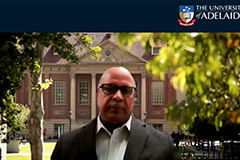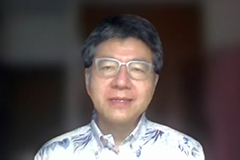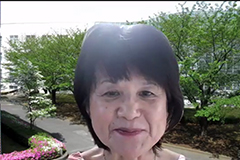Takahara and Ohno Participate in Online Symposium on ‘Japan-Australia Cooperation in a COVID World’
2021.08.06
On July 15, 2021, JICA Ogata Sadako Research Institute for Peace and Development (JICA Ogata Research Institute) Director Takahara Akio and National Graduate Institute for Policy Studies (GRIPS) professor and JICA Ogata Research Institute Senior Research Advisor Ohno Izumi participated in the online symposium “Foreign Aid Policy: Japan-Australia Cooperation in a COVID World” held by the Stretton Institute at the University of Adelaide.
The event, held via Zoom, began with welcome remarks by the university’s Emeritus Professor and JICA Ogata Research Institute Visiting Fellow Purnendra Jain. “Today we wish to explore what Japan and Australia, as the two key nations in the Indo-Pacific, can do together cooperatively, specifically in the health sector in the context of the current pandemic,” he said.
Jain’s opening remarks were followed by more from Takahara, in which he gave an overview of Japan’s international cooperation. He described Japan’s approach as “unorthodox,” saying Japan has “tried to behave not as the teacher of development, but rather as a partner or a companion in the recipient nation’s developmental efforts.” The Japanese model of comprehensive cooperation has been characterized by a “trinity,” consisting of ODA, direct investment in the private sector, and imports to Japan. In the post-war era, Japan adopted the concept of human security, in which “people are free from want, fear and indignity,” he said. The country then promulgated a new vision of “a Free and Open Indo-Pacific” to better connect Asia and Africa and promote the stability and prosperity of the region. He described Australia as “Japan’s best partner” in the Indo-Pacific region, noting the two countries share the values of democracy and the rule of law. “I believe there is much that Japan can learn from Australia,” he added, citing multi-culturalism, which he said is important for human dignity, and Australia’s response to COVID-19.

Visiting Fellow Purnendra Jain gave opening remarks

Director Takahara Akio gave an overview of Japan’s international cooperation
Ohno gave a presentation entitled “Japanese Development Cooperation in a Changing World.” Japan has the dual experience of being a recipient and provider of international assistance, which has given it a unique perspective, she said. “Aid is not just for charity; it is to support graduation” from the need for assistance. She gave a detailed overview of the history and development of Japanese overseas assistance, before addressing the present. She said that we are in the age of turbulence, characterized by COVID-19 and its implications for developing countries, worsening inequity, fiscal stringency and the rise of nationalism in donor countries. In this turbulent era, she said, development cooperation continues to have an important role to play. "Although it cannot solve all the problems the world faces today, it can make a positive contribution by tackling root causes of the problems, facilitating learning, finding localized solutions and fostering social trust based on collaborative efforts,” she said. She concluded by saying that as like-minded Pacific countries and long-standing partners, Japan and Australia share common values and their development cooperation is key to sustainability, inclusiveness and resilience in the Indo-Pacific region.

Senior Research Advisor Ohno Izumi said, “Aid is not just for charity; it is to support graduation” from the need for assistance
In addition to “Session 1: An Overview of Japan and Australia’s Foreign Aid Policies,” in which Ohno participated, there were two other sessions: “Japan and Australia: Contribution to Global Health via Development Cooperation Policy” and “Japan-Australia Cooperation in a COVID World: The Case of South Pacific Island Nations.”

事業事前評価表(地球規模課題対応国際科学技術協力(SATREPS)).国際協力機構 地球環境部 . 防災第一チーム. 1.案件名.国 名: フィリピン共和国.

事業事前評価表(地球規模課題対応国際科学技術協力(SATREPS)).国際協力機構 地球環境部 . 防災第一チーム. 1.案件名.国 名: フィリピン共和国.

事業事前評価表(地球規模課題対応国際科学技術協力(SATREPS)).国際協力機構 地球環境部 . 防災第一チーム. 1.案件名.国 名: フィリピン共和国.

事業事前評価表(地球規模課題対応国際科学技術協力(SATREPS)).国際協力機構 地球環境部 . 防災第一チーム. 1.案件名.国 名: フィリピン共和国.

事業事前評価表(地球規模課題対応国際科学技術協力(SATREPS)).国際協力機構 地球環境部 . 防災第一チーム. 1.案件名.国 名: フィリピン共和国.